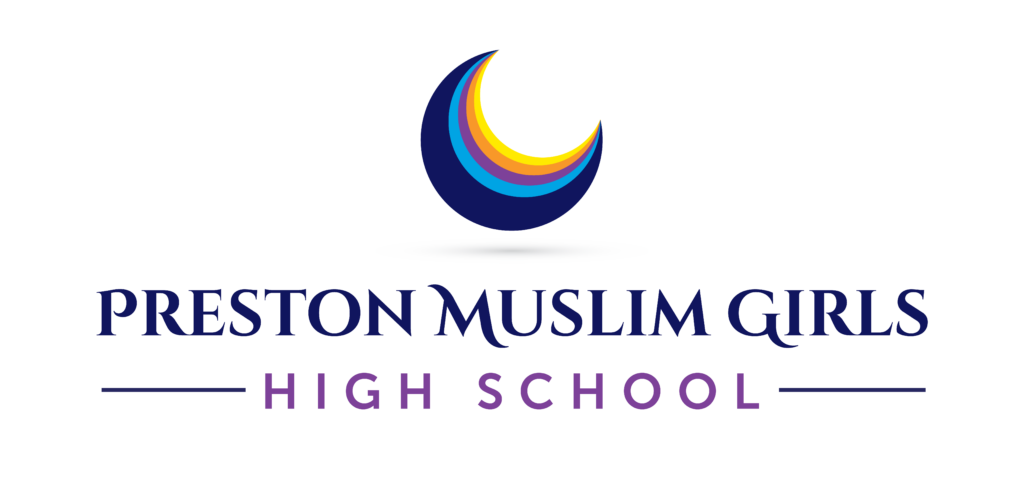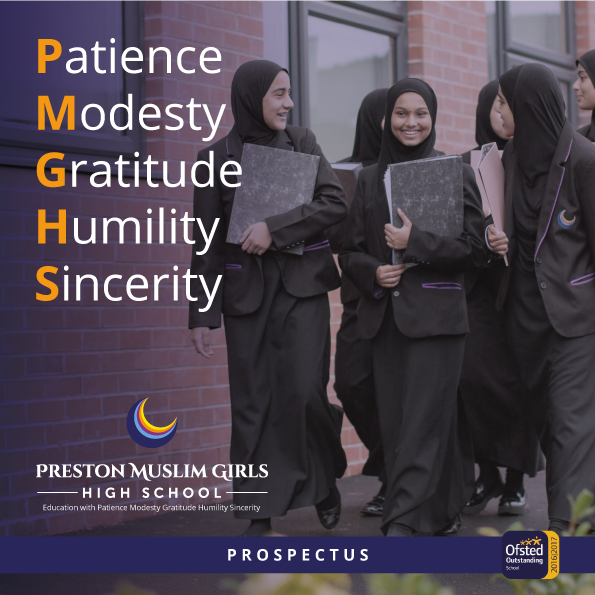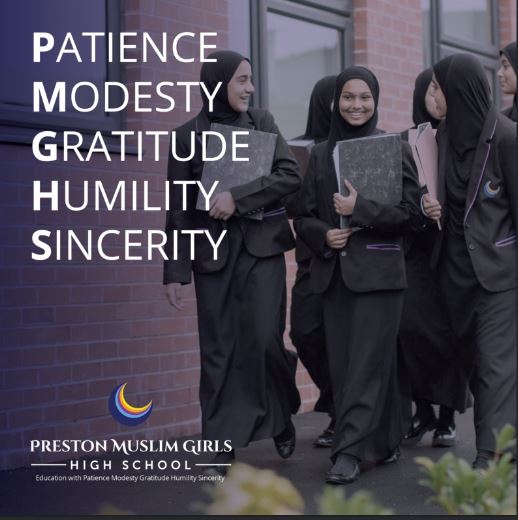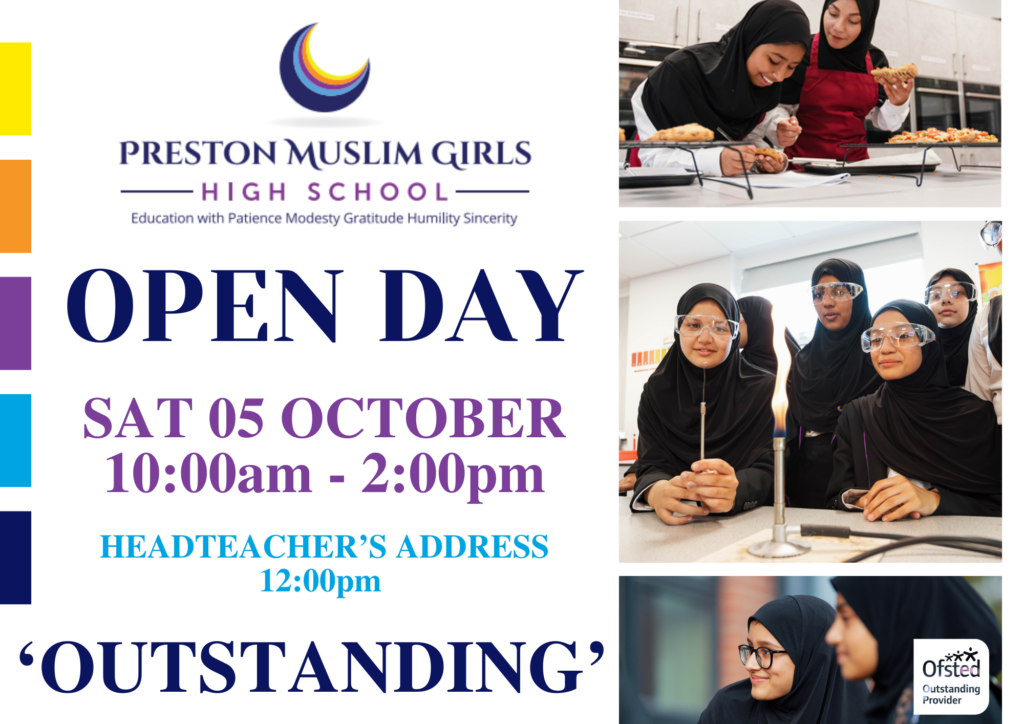We at PMGHS aim to provide an excellent educational experience that will develop each and every pupil to achieve her full spiritual, moral, social and educational potential, through a deep appreciation of her faith.
A school that aspires to create:
- Strong Islamic values
- Outstanding progress and outstanding GCSE results
- A safe and friendly environment where your daughter can be happy
- Happiness and wellbeing
- A curriculum that stretches and challenges all pupils
Success:
- Top 10 High school for pupil progress
- 2019 – Progress 8 – 10th in the country
- 2017, 2018, 2019 – Top school in Lancashire for pupil progress.
If you choose Preston Muslim Girls High School as your preference, you must also complete a Supplementary Information Form. Use the link below to download a copy of the form.
Supplementary-Information-Form-2022-2023
APPLY NOW!
Secondary School places September 2022:
- You must apply if your child is in their last year of primary school (Year 6) from September 2021.
- You must apply even if an older sister is already in school.
- If you’re a non- Lancashire resident apply through your own local authority.
- Please read the admission criteria for your chosen schools on the website.
CLOSING DATE: 31 OCTOBER 2021
Read About Our Courses
Subject Information
You will study a range of Arabic texts and will develop your skills in reading, writing and speaking the language. Arabic is the language of the Qur’an and a very useful language. Everybody, regardless of their age, has at one time or another thought about learning Arabic. Acquiring the Arabic language will allow you to explore different Arab cultures and it will also broaden your knowledge of the world and people around you. Also, when travelling abroad to the Middle East, this language will help your holiday become just that little bit extra special. During this course, you will develop the four language skills, reading, writing, listening and speaking to enhance your understanding of the Arabic language.
The course will cover many core topics ranging from basic weather, shopping and conversation to more complex topics such as media, letter writing and grammar.
Why study Arabic?
Studying Arabic at GCSE level meets both the educational and Islamic values of the school. It is the language of the Qur’an and our beloved Prophet S.A.W. If you decide to study Arabic after Year 11 then some colleges will offer the AS and A2 Arabic courses. This will add an extra dimension to your personal skill’s profile which will impress anyone who reads your CV. You will be in a stronger position to get a job in a company with international links, and you will improve your employability if you would like to work abroad.
Subject Information
The Art and Design curriculum provides pupils with a range of creative, exciting and stimulating opportunities to explore their interests in Art and Design in ways that are relevant and developmental. Pupils will be introduced to a variety of experiences exploring a range of media, techniques and processes. Pupils who can demonstrate the skill and ability to work independently can develop their creativity through the application of other mediums such as paint, textiles or ceramics.
Why study Art and Design?
Pupils will develop the skills that they need to become confident, creative and innovative problem-solvers through artistic project based tasks. They will communicate their ideas using visual methods whilst learning practical skills. Pupils will be encouraged to continuously improve through the reflection and critical analysis of their own work and that of other professional artists and designers. Pupils will also be expected to develop skills in independent working, time management and organisation.
Studying Art and Design alongside other academic subjects will provide pupils with a broader range of skills for the future. The portfolio of evidence that they will produce can be used during interviews with prospective employers and colleges. Whilst you may have heard of the obvious careers within Art and Design such as Architect, Fine Artist, Graphic Designer, Fashion Designer, Sculptor or Gallery Assistant there are many other careers available for those who are able to envision, design and create beautiful things. For a list of over 150 different career paths within Art and Design you can visit the following website: www.studentartguide.com/ articles/art-careers-list.
Subject Information
The specification for this subject is structured into two themes, taking students from how entrepreneurs start businesses (Theme 1) through to growing and global businesses (Theme 2).
Theme 1: Investigating Small Business
Theme 1 concentrates on the key business concepts, issues and skills involved in starting and running a small business. It provides a framework for students to explore core concepts through the lens of an entrepreneur setting up a business.
Content overview
- Topic 1.1 Enterprise and entrepreneurship
- Topic 1.2 Spotting a business opportunity
- Topic 1.3 Putting a business idea into practice
- Topic 1.4 Making the business effective
- Topic 1.5 Understanding external influences on business
Theme 2: Building a Business
Theme 2 examines how a business develops beyond the start-up phase. It focuses on the key business concepts, issues and decisions used to grow a business, with an emphasis on aspects of marketing, operations, finance and human resources. It also considers the impact of the wider world on the decisions a business makes as it grows.
Content overview
- Topic 2.1 Growing the business
- Topic 2.2 Making marketing decisions
- Topic 2.3 Making product decisions
- Topic 2.4 Making financial decisions
- Topic 2.5 Making human resource decisions
Why study Business Studies?
This GCSE course could lead to the following careers:
- Accountancy
- Marketing
- Public Relations
- Business Law
- Management
- Human Resources
Subject Information
Computer Science is relevant to the modern, changing world of computing; it’s designed to boost computing skills essential for 21st century. OCR’s GCSE (9–1) in Computer Science will encourage pupils to:
- understand and apply the fundamental principles and concepts of Computer Science, including abstraction, decomposition, logic, algorithms, and data representation
- analyse problems in computational terms through practical experience of solving such problems, including designing, writing and debugging programs
- think creatively, innovatively, analytically, logically and critically
- understand the components that make up digital systems, and how they communicate with one another and with other systems
- understand the impacts of digital technology on the individual and wider society
- apply mathematical skills relevant to Computer Science
Why study Computer Science?
The Computer Science qualification will be relevant to the modern and changing world of Computer Science. Computer Science is a practical subject where pupils can apply the knowledge and skills learned in the classroom to real-world problems. It is an intensely creative subject that involves invention and excitement. The Computer Science GCSE will value computational thinking, helping learners to develop the skills to solve problems and design systems that do so.
These skills will be the best preparation for pupils who want to go on to study Computer Science at AS or A Level and beyond. The qualification will also provide a good grounding for other subject areas that require computational thinking and analytical skills.
Subject Information
This qualification is designed for people who are looking to gain knowledge and skills of IT software applications to progress their learning in IT, or any subject where basic IT skills are required. The qualification covers core IT applications commonly used in many organisations around the world.
Completing this qualification will improve pupils’ understanding of key IT applications and teach them how to use the software efficiently. They will learn how to choose the right software application and use different techniques to get a job done. It enables pupils to use a computer confidently and effectively, and encourages problem-solving, creativity and communication.
The qualification provides pupils with skills to improve productivity through IT and enables them to review and adapt their ongoing use of IT tools and systems to make sure that activities are successful.
Structure of the qualification
Cambridge Nationals in Creative iMedia qualification consists of four mandatory units at Level 2:
- Pre-production skills
- Creating digital graphics
- Creating a multipage website
- Creating interactive multimedia products
Pupils must pass all four mandatory units to be awarded the qualification.
Subject Information
English Language
English Language is, of course, a vital subject and the skills covered underpin the whole curriculum. Moreover, any course of study beyond GCSE demands proof of achievement in this subject, and literacy skills are necessary for the world of work. Perhaps, more importantly, however, the study of English equips young people with the communication skills that allow them to present themselves confidently, encourages creativity in written and oral expression, and develops a love for literature that will last a lifetime.
The course provides a balanced and varied curriculum through Key Stage 3 and 4. Units of work focus on developing pupils’ knowledge, skills and understanding of reading, writing and communication through oral opportunities.
Exam preparation: English Language (100% Examination)
Through the study of a selection of extracts from 19th-, 20th- and 21st-century prose fiction, pupils develop skills of analysis and evaluation; develop imaginative writing skills to engage the reader; develop transactional writing skills for a variety of forms, and learn to use spelling, punctuation and grammar accurately.
There will be two examination papers, one which will involve the analysis and evaluation of an unseen 19th century text, as well as a linked transactional writing task. The second paper involves the analysis and evaluation of a 20th century text together with a piece of linked imaginative writing.
Subject Information
Studying English Literature unlocks the world, allowing an understanding of culture, history, society and politics that might otherwise be closed off. It is about people and emotions, unlocking feelings the pupils may never have seen played out or felt themselves. It allows humans to think deeply, and form an understanding about, issues that might never have been in their consciousness without it.
By studying GCSE English Literature, pupils will come to appreciate words and the power they can hold for years after they have been written. Pupils will become better thinkers. Reading texts from the genres of prose, poetry and drama, they will closely analyse themes, characters and literary techniques whilst considering the social and cultural contexts in which they were written. In reading about a wide range of cultures and intellectual traditions, pupils will be challenged to think critically about complex topics from different perspectives. Pupils will develop their own opinions about the issues covered and learn how to present their interpretations to others. While analysing classic texts and authors, pupils will gain core reading comprehension and writing skills which will be valuable in their life and their chosen career path.
Exam Preparation: English Literature (100% exam)
- One play by William Shakespeare
- One 19th Century novel/novella
- One 20th/21st Century text (could be either prose or drama)
- A selection of poetry from a pre-release anthology as well as unseen poetry
Subject Information
The Food Preparation and Nutrition GCSE will help you to develop a greater understanding of nutrition, food provenance and the working characteristics of food materials. You will also learn about food from around the world, through the study of British and international culinary traditions as well as developing an understanding of where food comes from (food provenance) and the challenges surrounding food security. You’ll master culinary skills and appreciate the science behind food and cooking. This is an exciting and creative course which will allow you to demonstrate your practical skills and make connections between theory and practice.
Why study Food Technology?
GSCE Food Technology will focus on food preparation and nutrition. This will equip you to go on to further study. After taking this course, you could embark on AS or A-level study, begin an apprenticeship or perhaps begin employment in the catering or food industries. You’ll also have the knowledge and skills to feed yourself (and others) affordably and nutritiously for life.
Subject Information
We offer French to all students in Year 7 and Year 8 then students can choose French as an option. We are passionate about the benefits which learning a language can bring, and aim to create lessons which are challenging and promote independent thinking skills, whilst fully supporting all students and encouraging them to take risks. The course covers a wide variety of everyday topics such as: family, relationships and marriage; social media and mobile technology; free-time activities; home and local area; social and global issues; travel and tourism. Our objective is to enable students of all abilities to develop their French language skills to their full potential, equipping them with the knowledge and confidence to communicate in a variety of contexts.
Why study French?
We strongly believe in languages as a skill for life and something that students can enjoy and find rewarding. All four skills, listening, speaking, reading and writing, are developed, enabling the students to communicate and interact effectively in French. French is spoken in approximately 33 countries across 5 continents. Studying French at GCSE can lead to further study; exciting courses exist to combine French with other subjects such as Marine Biology with French, French for Law, European Business with French and many more. Language learners are increasingly viewed as a valuable asset within companies and society.
Subject Information
Geography is the study of Earth’s landscapes, peoples, places and environments. It is, quite simply, about the world in which we live. Geography is unique in bridging the social sciences (Human Geography) with the natural sciences (Physical Geography).
The aim of Geography at PMGHS is to:
- Actively engage in the process of Geography and to develop as effective and independent learners and as critical and reflective thinkers with enquiring minds.
- To develop students’ knowledge and understanding of geographical concepts and appreciate the relevance of these concepts to our changing world.
- To develop a framework of spatial awareness in which to appreciate the importance of the location of places and environments from local to global.
Why study Geography?
Geography offers a wide range of career prospects such as: Teacher, Cartographer, Weather Forecaster, Writer, Researcher, Journalist and Emergency Management.
Subject Information
The BTEC Health and Social Care programme is aimed to support our learners to succeed and progress in their education.
The course has been developed to:
Give learners a more focused understanding of health and social care through the selection of optional specialist units.
Give learners the opportunity to develop a range of personal skills and techniques, through the selection of units that are essential for successful performance in working life.
Give opportunities for learners to achieve a nationally recognised Level 2 Health and Social Care qualification.
Support progression into a more specialised Level 3 vocational or academic course or into an apprenticeship.
Why study Health and Social Care?
On successful completion of the BTEC First Certificate students may progress on to the BTEC Level 3 Extended Diploma in Health and Social Care or other BTEC Level 3 course, or alternatively an apprenticeship or training position. This course could, thereafter, lead to careers such as:
- Nursing
- Social Work
- Mental Health
- Childcare
- Support Work
- Youth and Community Work
Subject Information
At PMGHS the History Department prepares pupils for the future, equipping them with knowledge and skills that are prized in adult life, enhancing employability and developing an ability to take part in a democratic and multi-cultural society.
Why study History?
A high-quality history education will help pupils gain a coherent knowledge and understanding of Britain’s past and that of the wider world. It should inspire pupils’ curiosity to know more about the past. It challenges pupils to ask perceptive questions, think critically, weigh evidence, sift arguments, and develop perspective and judgement. History helps pupils to understand the complexity of people’s lives, the process of change, the diversity of societies and relationships between different groups, as well as their own identity and the challenges of their time.
Subject Information
Our objective is to enable pupils to build a secure framework of mathematical reasoning, which pupils can use and apply with confidence in any spheres of their life.
Mathematics contributes to the school curriculum by developing pupils’ abilities to calculate; to reason; to solve problems and to handle data. It is an important core subject.
Why study Maths?
Maths graduates may not always be aware of the various employment opportunities available to them, such as: Accountancy, Aerospace & Defence, Automotive, Biosciences, Business Support Services, Chemical and Construction Industries.
Subject Information
Physical Education enables pupils to enhance their well-being, develop essential life skills and experience new activities that they will find beneficial when they leave school.
Pupils get an opportunity to achieve a Bronze Duke of Edinburgh award in Year 10. This award helps them to develop key skills such as resilience, commitment, team work, co-operation and personal development. Furthermore, it helps them to develop the skills and attitudes they need to become more rounded, confident young adults.
Why study PE?
PE isn’t just about sports you will learn a lot about health, well-being and the human body. You’ll gain many valuable skills from studying PE that will help you in other GCSE subjects as well as your future career. In addition to physical fitness some of the skills that you will develop include: communication, analysis, evaluation, social and of course leadership.
PE lends itself to a range of careers in sports and fitness as well as other industries that you may not have considered before. Some of these are: sports science, PE teacher, physiotherapist, professional sports person, sports coach/ consultant, diet and fitness instructor and personal trainer.
Subject Information
The course specification offers flexibility in selecting religions to study and covers various topics which are both relevant and engaging to our pupils. It allows for a greater emphasis to be placed on the study of one religion and brings to life the foundations of faith and practice.
This specification consists of 3 Areas of Study, which are then assessed through 3 externally set examination papers.
Why study Religious Studies?
It can help pupils understand global issues, and become more involved as a global citizen.
It can help you understand what it means to be ‘British’ in the 21st century.
It will provide an opportunity for pupils to share their opinions in a meaningful way.
With the growing multiculturalism within the UK and other parts of the world, it will give you a helping hand to understand other cultures.
Subject Information
We aim to provide the highest standard of science education and make a difference by focusing on Curiosity, depth of understanding and questioning. Allowing pupils to work safely whilst having access to innovative, adventurous, stimulating and engaging science lessons create a place where young people make exciting and excellent progress, have an understanding of how science links to ‘real life’ and can have their dreams fulfilled and be encouraged to exceed their expectations.
Why study Science?
Science makes a positive impact on people’s lives. In many cases, science saves lives. Scientists use their expertise to develop real solutions for real problems. Remedies for many of the challenges that face our world will be developed by researchers who devote their whole lives to the pursuit of science. It leads on to a wide range of career choices.
Trilogy Double Award 2 GCSEs – AQA exam board
Subject content:
- Cell biology
- Organisation
- Infection and response
- Bioenergetics
- Homeostasis and response
- Inheritance, variation and evolution
- Ecology
- Atomic structure and the periodic table
- Bonding, structure, and the properties of matter
- Quantitative chemistry
- Chemical changes
- Energy changes
- The rate and extent of chemical change
- Organic chemistry
- Chemical analysis
- Chemistry of the atmosphere
- Using resources
- Energy
- Electricity
- Particle model of matter
- Atomic structure
- Forces
- Waves
- Magnetism and electromagnetism
Combined Science, equivalent of 2 GCSE’s- Edexcel exam board
Biology:
- Key concepts in biology
- Cells and control, Genetics
- Natural selection and genetic modification
- Health, disease and the development of medicines
- Plant structures and their functions
- Animal coordination, control and homeostasis
- Exchange and transport in animals
- Ecosystems and material cycles
Chemistry:
- Key concepts in chemistry,
- States of matter and mixtures,
- Chemical changes,
- Extracting metals and equilibria,
- Groups in the periodic table,
- Rates of reaction and energy changes,
- Fuels and Earth science
Physics:
- Key concepts of physics
- Motion and forces
- Conservation of energy,
- Waves,
- Light and the electromagnetic spectrum,
- Radioactivity,
- Energy – Forces doing work,
- Forces and their effects,
- Electricity and circuits,
- Magnetism and the motor effect, Electromagnetic induction
- Particle model
- Forces and matter
Biology, Chemistry & Physics 3 GCSEs – AQA exam board
Biology GCSE
- Cell biology
- Organisation
- Infection and response
- Bioenergetics
- Homeostasis and response
- Inheritance, variation and evolution
- Ecology
- Key ideas
Chemistry GCSE
- Atomic structure and the periodic table
- Bonding, structure, and the properties of matter
- Quantitative chemistry
- Chemical changes
- Energy changes
- The rate and extent of chemical change
- Organic chemistry
- Chemical analysis
- Chemistry of the atmosphere
- Using resources
Physics GCSE
- Energy
- Electricity
- Particle model of matter
- Atomic structure
- Forces
- Waves
- Magnetism and electromagnetism
- Space physics (physics only)
Subject Information
Key Stage 4
Examination Board: Edexcel
In preparation for the GCSE examination, the Edexcel specification themes are followed to enhance the language comprehension of the pupils. These are taught through text books, novels, movies & role plays.
GSCE Urdu consists of four externally examined papers based on the following skills: listening, speaking, reading and writing. Each paper is available at Foundation Tier or Higher Tier. Each exam contributes 25% towards the final GCSE Grade.
Paper 1: Listening and understanding in Urdu
Pupils are assessed on their understanding of standard spoken Urdu by one or more speakers in a range of public and social settings. Pupils will respond to multiple-response and short-answer open-response questions based on a recording featuring male and female Urdu speakers.
Paper 2: Speaking in Urdu
Pupils are assessed on their ability to communicate and interact effectively through speaking in Urdu for different purposes and in different settings.
There are three tasks which must be conducted in the following order:
Task 1 – a role play based on one topic that is allocated by Pearson
Task 2 – questions based on a picture stimulus based on one topic that is allocated by board
Task 3 – conversation based on two themes. The first theme is based on the topic chosen by the pupil in advance of the assessment. The second theme is allocated by board.
Paper 3: Reading and understanding in Urdu
Pupils are assessed on their understanding of written Urdu across a range of different types of texts, including advertisements, emails, letters, articles and literary texts. Pupils are required to respond to multiple-response and short-answer questions based on these texts.
Pupils must answer all questions in each of the three sections:
Section A is set in English. The instructions to pupils are in English.
Section B is set in Urdu. The instructions to pupils are in Urdu.
Section C includes a translation passage from Urdu into English with instructions in English.
Paper 4: Writing in Urdu
Pupils are assessed on their ability to communicate effectively through writing in Urdu for different purposes and audiences. Pupils are required to produce responses of varying lengths and types to express ideas and opinions in Urdu. The instructions to pupils are in Urdu. Word counts are specified for each question.



